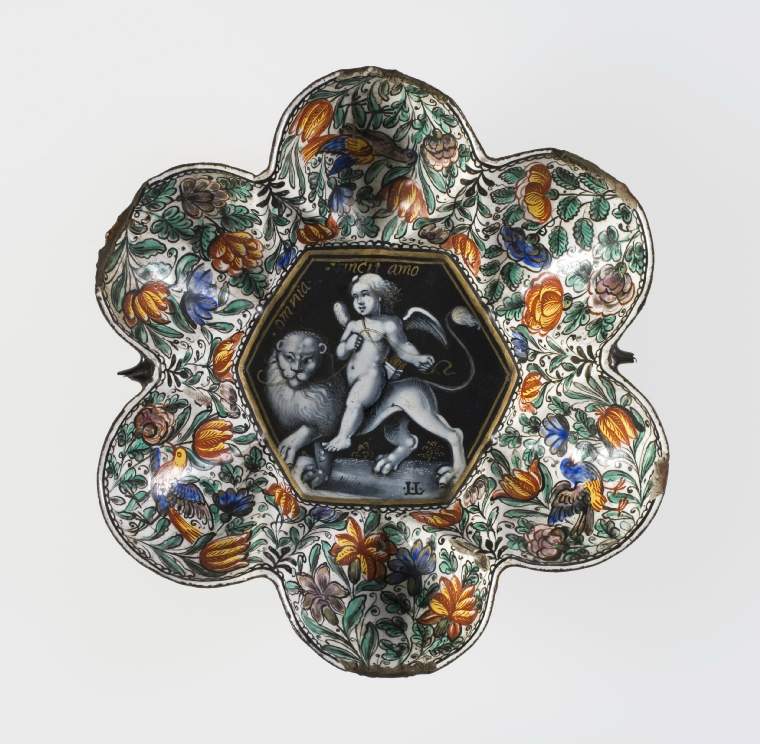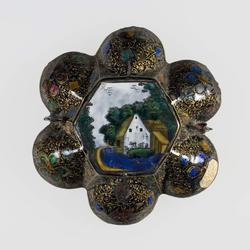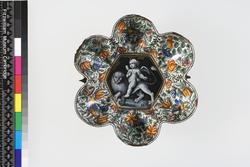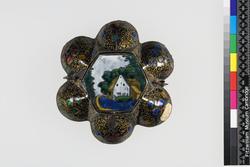Current Location: In storage
Maker(s)
Maker:
Laudin, Jacques I
Entities
Categories
Description
Copper, decorated with en grisaille and polychrome enamels and gilding. Cupid riding on a lion with inscription 'omnia.vincit amo' surrounded by stylized flowers and birds on a white ground; on the reverse, a cntral landscape, surrounded by stylized flowers and foliage on a black ground.
Copper, raised, and decorated in three techniques: painted en grisaille on a black ground and gilded; painted in blue, green, yellow, orange-red, pale manganese/mulberry, and black on a white ground; and enamelled in blue, turquoise, green, yellow, and mulberry over silver foils in a black ground, and gilded. The hexafoil bowl has lobed sides rising from an almost flat hexagonal base, and the stumps of two small S-shaped handles on opposing sides. In the middle framed by two gold lines is a hexagonal panel executed in grisaille on a black ground of Cupid riding on a lion walking to the left. Cupid has a quiver of gold arrows slung on his back by a gold strap, and controls the lion by means of a gold leash passing through its mouth. On the left and above is the inscription ‘.omnia.vincit amo’ in gold. On the low skyline below the lion there are two very small gold trees. The initials ‘•I•L•’ are inscribed in front of the lion’s rear left paw. The sides have a white ground painted with blue, pale mulberry, and red and yellow flowers, and green leaves on black stems, amongst which on three lobes is a fanciful bird. Round the rim is a black line with continuous scallops below.
On the base is a landscape with a mill house beside a pond. a path and a bridge on which is a red and gold man holding a staff. Behind the house there are trees, and two flocks of birds in the sky. The black sides are decorated in translucent enamels over foils with flowers with gold foliage, and, on two lobes, with an owl and a fanciful bird respectively.
Notes
History note: Professor James Dewar, FRS (1842–1923), 1 Scroope Terrace, Cambridge; Puttick & Simpson’s sale at the house, 26-27 May 1924, first day, part of lot 112; bought by Stanley Woolstan on behalf of Dr J.W.L. Glaisher, FRS (1848–1928), Trinity College, Cambridge
Legal notes
Dr J.W.L. Glaisher Bequest
Measurements and weight
Height: 3.5 cm
Acquisition and important dates
Method of acquisition: Bequeathed
(1928-12-07)
by
Glaisher, J. W. L., Dr
Dating
17th Century, second half
Circa
1650
CE
-
1695
CE
Note
Small two-handled bowls or cups with hexafoil or circular rims have survived in large numbers. Most of the hexafoil examples are decorated on the base with a landscape, surrounded by stylized flowers and birds in translucent enamels over foils in a black ground embellished with gold foliage. Others have floral decoration on a white ground.The central medallion inside may be of a religious, classical, or other secular subjects, and the interior sides are usually decorated with polychrome flowers and birds on a white ground in either a continuous band or in panels. Many of them bear the initials ‘.I.L.’ and these have usually been attributed to Jacques Laudin I (c. 1627-95), for example by Darcel and Marquet de Vasselot, although it is possible that some of them were executed by his nephew Jacques II Laudin (c. 1663-1729). However, the decoration of the reverse of the Fitzwilliam’s bowl, resembles that on other pieces attributed to Jacques I Laudin.
Cupid riding a lion, emblematic of the power of Love occurs on several of the bowls. The inscription ‘omnia vincit amor’ was taken from Virgil’s Eclogues, X, 69, ‘omnia vincit Amor: et nos cedamus Amori.’ (Love conquers all; let us, too, yield to Love’). Hexafoil bowls with the same subject are in the Fitzwilliam (M.51-1904), Musée Municipal de l’Éveché, Limoges (Inv. 101); and bowls with circular rims in the Ashmolean Museum (OA 248); Victoria and Albert Museum (C.23-1923), and the Musée des Beaux-Arts, Dijon (Inv. no. CA T 1322; acq. 1878) . Another, shape uncertain, was formerly in the Königliche Kunstkammer Berlin, (Inv. I.G.179 or K 5084), but was lost.
People, subjects and objects depicted
Components of the work
Decoration
composed of
enamel
( blue, green, yellow, orange-red, pale manganese/mulberry, white, and black)
gold
Lobe To Lobe
Diameter 15.2 cm
Bowl
Materials used in production
Copper
Inscription or legends present
- Text: .omnia.vincit amo
- Location: On left of central area
- Method of creation: Painted in gold
- Type: Inscription
- Text: ‘•I•L•
- Location: In front of the lion’s rear left paw
- Type: Initials
Inscription present: rectangular paper label with rounded sides
- Text: Six lobed enam -/elled tray with Cupid/riding a lion at the/bottom, and underneath/a cottage and trees../b. at the Dewar sale at/Cambridge May 26/ 1904
- Location: On one lobe near to the rim on the exterior
- Method of creation: Hand-written in black ink
- Type: Label
References and bibliographic entries
-
Alumni cantabrigienses: a biographical list of all known students, graduates and holders of office at the University of Cambridge, from the earliest times to 1900
-
Oxford Dictionary of National Biography
-
Le métier d’émailleur à Limoges, XVIe-XVIIe siècle
page(s): 386, 388
-
Catalogue descriptif des objets d’art formant le musée Anthelme et Edma Trimolet
-
Catalogue of the Valuable Collection of Pictures, Works of Art, and Decorative Objects of Christopher Beckett Denison, Esq., Deceased, late of Upper Grosvenor Street, First Portion
page(s): 77
-
Guide du Musée Municipal, Collection Égyptienne, Émaux
page(s): 75
Identification numbers
Accession number: M.3-1928
Primary reference Number: 156451
Stable URI
Audit data
Created: Saturday 6 August 2011
Updated: Tuesday 19 March 2024
Last processed: Thursday 14 August 2025
Associated departments & institutions
Owner or interested party:
The Fitzwilliam Museum
Associated department:
Applied Arts

 IIIF Manifest
IIIF Manifest






